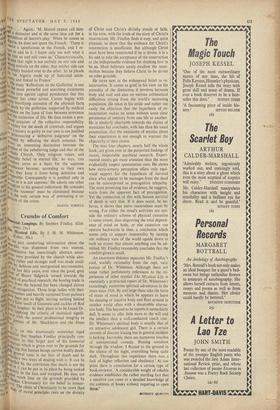ve Iv Mystical Life. By J. H. M. Whiteman. o i e ra1
1,4 ' (Faber, 30s.) a O. if,„(he Past comforting information about the the' i\ "Ilfe was dispensed from two sources. iii2reW t Lit 1°Ettative but unexcitingly abstract assur- E the :e11iehes were provided by the church while alto- Ji) tither richer and stronger stuff was made avail- e le ub, ,) ibY dubious and unorganised necromancers. P 41' , le last fifty years, ever since the good, grey too .eo word nbi I of Henry Sidgwick turned towards the have IN, "et of psychical research, the bootleg trade ln ..war )at ' from the beyond has been changed almost ,The ,tin g recognition. Those large ladies with their )ourines and heavily curtained front parlours Mr '44v Ahi. ' been put to flight, leaving nothing behind netit havii, rwil faint smell of Guinness and cackles of Red f 'In laughter. In their place is to be found Dr. ii ,:ie 0.; °4 4Pplying the criteria of statistical signifi- it J.: an wade he ce8 uwe sistehs theof e utmost ossth aporkoifeetsos ilio professional and integrity r i Jones ntoos -titlef. bqi.
volP It
0 „ts on this emotionally somewhat tepid bp i tat alifk telltllal that Stephen Findlay principally con- oiirates in that larger part of his immortal {k h ''/Rs which is given over to the grounds for 'Ina that human beings survive bodily death. dr1 pneral topic is our fear of death and he is ilders two ways of dealing with it. It can be nrited by the conviction that death is not the gh (11' it can be put in its place by being looked petlirelY in the face and accepted. He does not id much time on the grounds provided by °dox Christianity for the belief in immor- Y. The claim of Christianity to be more than dY of moral principles rests on the divinity of Christ and Christ's divinity stands or falls, in his view, with the truth of the story of Christ's resurrection. Mr. Findlay finds it easy, and quite pleasant, to show that the evidence for Christ's resurrection is insufficient. But although Christ must have been resurrected if he is divine, it is a bit odd to take the acceptance of the resurrection as the indispensable evidence for thinking him to be so. Most believers surely swallow the resur- rection because they believe Christ to be divine on other grounds.
He turns next to the widespread belief in re- incarnation. It comes to grief in his view on the unreality of the distinction it involves between body and soul and also on various arithmetical difficulties arising from the world's increasing population. He takes in his stride and rather too easily the objection that the hypothesis of re- incarnation makes no sense without some clear persistence of memory from one life to another. He is similarly charitable towards the claims of mysticism but concludes, with less than his usual penetration, that the unanimity of mystics about their experiences is not enough to warrant the objectivity of their claims.
The next four chapters, nearly half the whole book, are given over to the purported findings of recent, respectable psychical research. Experi- mental results get more attention than the more evidentially suspect spontaneous ones. He shows how extra-sensory perception offers only equi- vocal support for the hypothesis of survival since what appear to be messages from the dead can be reinterpreted as precognitive telepathy. The most promising line of evidence, he suggests, starts from the apparent fact of precognition. Yet the connection of this with human survival of death is very thin. If it does occur, he be- lieves, it shows that naïve materialism must be wrong. For either the mind's activities are out- side the ordinary scheme of physical causation to some extent, thus disproving the total depend- ence of mind on body, or else causation can operate backwards in time, a conclusion which seems only to support immortality by turning our ordinary view of the world upside down to such an extent that almost anything can be ad- mitted. Mr. Findlay reasonably concludes that the comfort given is small.
An enormous distance separates Mr. Findlay's cool, worldly rationality from the rapt, vatic ecstasy of Dr. Whiteman. Although there are some rather perfunctory references to the ex- periences of other mystics The Mystical Life is essentially a protracted report of Dr. Whiteman's exceedingly numerous spiritual adventures in the years since 1926. By and large these take the form of states of mind in which he appears to leave his sleeping or inactive body and float around in another world often with a discernible alterna- tive body. The beyond as he reports it seems fairly dull. It seems to offer little more to the will and the intellect than a well-conducted coach tour. Dr. Whiteman's spiritual body is usually that of an attractive adolescent girl. There is a certain amount of discreet kissing but in general incident is lacking. Inevitably there are numerous touches of unintentional comedy. 'Passing somehow through the window, I floated to the ground in the silence of the night, everything being quite dark. Throughout this experience there was a lack of higher reflection and obedience.' At one point there is consolation for a certain type of book-reviewer. `A considerable weight of reliable evidence establishes the rather startling fact that a sensitive can come to a detailed knowledge of the contents of books without requiring to open them.'
ANTHONY QUIN ION






































 Previous page
Previous page